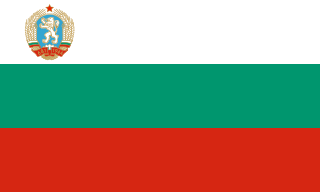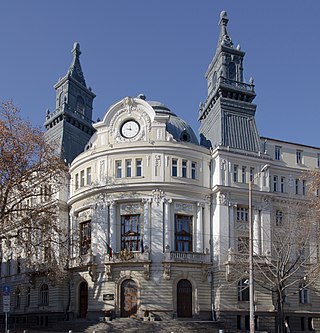
The Bulgarian Revival, sometimes called the Bulgarian National Revival, was a period of socio-economic development and national integration among Bulgarian people under Ottoman rule. It is commonly accepted to have started with the historical book, Istoriya Slavyanobolgarskaya, written in 1762 by Paisius, a Bulgarian monk of the Hilandar monastery at Mount Athos, leading to the National awakening of Bulgaria and the modern Bulgarian nationalism, and lasting until the Liberation of Bulgaria in 1878 as a result of the Russo-Turkish War of 1877–1878.

The Bulgarian Revolutionary Central Committee was a Bulgarian revolutionary organisation founded in 1866 by Georgi Rakovski, among the Bulgarian emigrant circles in Romania. The decisive influence for the establishment of the committee was exerted by the Svoboda ("Freedom") newspaper which Lyuben Karavelov began to publish in the autumn of 1869. Some of the other revolutionaries who took active part in the formation and work of the BRCK were Panayot Hitov, Vasil Levski and Dimitar Tsenovich.

Bulgaria competed at the 1980 Summer Olympics in Moscow, USSR. 271 competitors, 183 men and 88 women, took part in 151 events in 20 sports.
Epizod is a Bulgarian heavy metal band formed in 1983 in Sofia. The first songs of the band were inspired by the French poet François Villon. Epizod are famous in Bulgaria for their concerts which include theatre, an Orthodox church choir, and an ensemble for Bulgarian folk songs and dances.

The Bulgaria men's national basketball team represents Bulgaria in international basketball. The governing body is the Bulgarian Basketball Federation.
Sofia University "St. Kliment Ohridski" is a public research university in Sofia, Bulgaria. It is the oldest institution of higher education in Bulgaria.
Nikolov, feminine Nikolova, is a Macedonian and Bulgarian patronymic and family name, derived from the personal name Nikola and may refer to:
100 Tourist Sites of Bulgaria is a Bulgarian national movement established in 1966 to promote tourism among Bulgaria's most significant cultural, historic, and natural landmarks.

The name of the ministry was changed in 2022 by the Ministry of Agriculture, Food and Forestry to the Ministry of Agriculture.

Nikola Tihov Obretenov was a Bulgarian revolutionary, one of the combatants for the liberation of Bulgaria, and a participant in the Stara Zagora Uprising and the April Uprising. His book "Memories About Bulgarian Uprisings" was published posthumously and is a primary source of historical information about those events.

Panayot Ivanov Hitov was a Bulgarian haidoutin (hajduk), national revolutionary and voivoda.

The Central Sofia Cemetery or the Orlandovtsi Cemetery ("Орландовци") is the main cemetery in Sofia, the capital of Bulgaria. The cemetery has several chapels used by various Christian denominations, such as a Bulgarian Orthodox church of the Dormition of the Theotokos, a Roman Catholic chapel of Saint Francis of Assisi, an Armenian Apostolic chapel, a Jewish synagogue, etc. The cemetery also features Russian, Serbian, Romanian and British military sections.
Sofia Residents in Excess is a Bulgarian TV comedy-drama series produced by BTV and Dream Team Production that premiered on BTV on 23 March 2011.
The 1950 Bulgarian Cup final was the 10th final of the Bulgarian Cup. It was contested by Levski Sofia and CSKA Sofia. It took three matches at People's Army Stadium to determine a winner. The first took place on 26 November, the second on 27 November and the third on 3 December 1950. The cup was won by Levski Sofia. They won the 2nd replay 1–0 after extra time.
The Tree of Life on Bulgarian Дървото на живота is a Bulgarian historical drama of TV7. Executive producers are Evtim Miloshev and Lyubomir Neikov with new company Dream Team Films. "The Tree of Life" aired in prime-time on TV7, as the first Bulgarian historical series in the recent history of the country. In the series involved some of the most famous Bulgarian actors. Director of the series Todor Chapkanov and responsible operator Lorenzo Senator.








